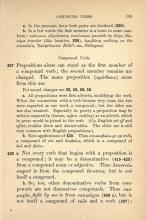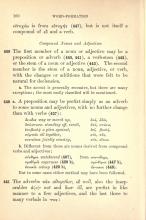437. Prepositions alone can stand as the first member of a compound verb; the second member remains unchanged. The name preposition (πρό-θεσις) arose from this use.
For sound changes see §§ 32, 42, 50, 52.
a. All prepositions were first adverbs, modifying the verb. When the connection with a verb became very close, the two were regarded as one word, a compound; but the older use was also retained. Especially in poetry a preposition may be written separately (tmesis, τμῆσις cutting) as an adverb, which in prose would be joined to the verb. (Cp. English set off and offset, trodden down and downtrodden. The older use is still very common with English prepositions.)
b. Note applications of § 435. Thus συν-αναβαίνω go up with, a compound of σύν and ἀναβαίνω, which is a compound of ἀνά and βαίνω.
438. a. Not every verb that begins with a preposition is a compound; it may be a denominative (§§ 415 – 423) from a compound noun or adjective. Thus ὑποπτεύω (suspect) is from the compound ὕπ-οπτος, but is not itself a compound.
b. So, too, other denominative verbs from compounds are not themselves compounds. Thus ναυ-μαχέω (fight by sea) is from ναυ-μάχος (§ 446.a), but is not itself a compound of ναῦς and a verb (§ 437); εὐτυχέω is from εὐτυχής (§ 447), but is not itself a compound of εὗ and a verb.


